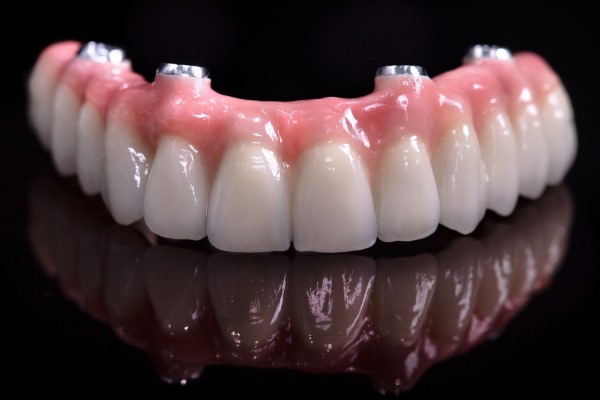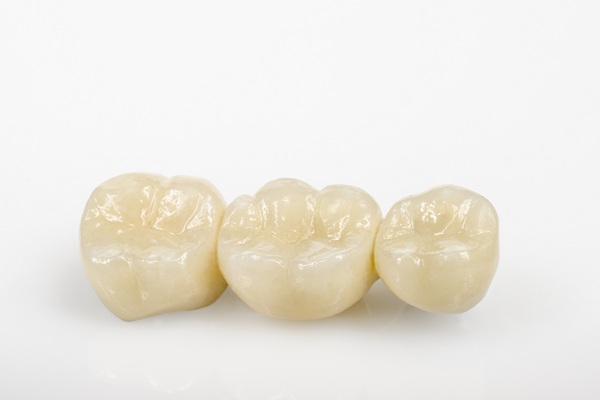Important Care Tips for All-on-4 Implants

An All-on-4® is a type of implant-supported denture that allows you to replace all of your teeth at the same time. It combines many of the benefits of dental implants and dentures, such as the longevity of dental implants. With proper care, All-on-4® implants last longer than removable dentures.
There are two aspects to caring for All-on-4® implants. There is postoperative care following the initial procedure to place the implants and then there is ongoing cleaning and maintenance after the artificial teeth are placed.
Postoperative care during recovery
It takes between three months and six months to recover completely from the All-on-4® implant procedure. This is not only to allow the surgical wounds to heal, which happens more quickly, but also to allow the implants to become completely fused with the jawbone. This has to happen for the implants to be functional and prevent failure. Here are some important steps to take during the recovery process.
Manage side effects
Postoperative swelling and pain are expected after any surgery, and the procedure to place All-on-4® implants is no exception. These are worse within the first 72 hours after your procedure and can be managed with pain medication and cold compresses placed on the sides of the face for 15 minutes at a time. If swelling persists after two to three days, you can switch to moist heat or alternate hot and cold compresses.
Rest
After your procedure, you should take it easy for at least a couple of days, possibly as long as a week. This means taking some time off from work and avoiding any strenuous activity, which could contribute to postsurgical complications. In the worst-case scenario, it could compromise the long-term integrity of your implants.
Modify your diet
You may have a temporary bridge placed following your surgery to maintain the normal appearance of your mouth until you receive your permanent artificial teeth. However, neither the implants nor the artificial teeth are strong enough for you to go immediately back to eating the way you did prior to surgery. During the recovery process, you have to limit yourself to eating soft foods that do not require much chewing.
While you are still healing from the surgery, you may have to limit yourself to liquid foods only for a few days. After that, you should still limit yourself to soft, easy-to-chew foods:
- Soups or stews
- Scrambled eggs
- Applesauce
- Noodles
- Tuna
- Slow-cooked meats
- Mashed potatoes
- Yogurt
Eating fruits and vegetables is a good idea for their nutritional value. Some, such as bananas and avocados, are naturally soft and can be eaten raw, while others may need to be cooked before they are soft enough to eat.
Once your recovery is over and your permanent artificial teeth are placed, you should be able to go back to eating many of the foods that you did before.
Keep your mouth clean
While good oral hygiene is always important, it is especially so when you are healing from surgery to prevent infection. In the first few days following surgery, this may mean rinsing with a special mouthwash because your usual oral hygiene techniques may cause further injury to your surgical wounds. Once you have healed sufficiently, you can go back to brushing and flossing as normal.
Follow your aftercare instructions
Following the procedure, you will be given aftercare instructions. These are specific to your procedure and should be given precedence over all other general instructions.
Ongoing maintenance following recovery
Once you have recovered fully and received your permanent appliance, you can care for your All-on-4® implants in much the same way that you would care for natural teeth, by brushing them at least twice a day and flossing them at least once daily. Your dentist may recommend that you use a certain type of floss designed specifically for implants or that you use a water flosser to clean gently between the artificial teeth. To avoid scratches or other damage, you should use a soft-bristle brush and avoid using toothpaste with harsh abrasives.
You should continue to see your dentist for regular examinations and cleanings after you receive your implants. The dentist can check for any problems affecting your implants or your oral health in general and recommend any necessary treatments.
Conclusion
Failing to care for your All-on-4® implants, especially during the postsurgical recovery period, could put you at risk for failure or other complications. By taking care of your implants, both during recovery and after, you may be able to avoid complications and help your implants last longer.
Request an appointment here: https://www.roderickgarciadmd.com or call Roderick A. Garcia, DMD PC at (505) 634-5029 for an appointment in our Albuquerque office.
Check out what others are saying about our dental services on Yelp: All-on-4 Dental Implants in Albuquerque, NM.
Recent Posts
If you’ve lost a lot of teeth and thought about getting dental implants, then you may have heard about All-on-4® implants. Like most things, though, you may be concerned that there are issues with side effects. After all, dental implants require oral surgery and putting prosthetics into your mouth, so it’s important to know whether…
All-on-4® is one of the most effective ways to give yourself back the smile you deserve. If you miss multiple teeth, talk to your dentist about having this procedure done. It may be the right solution for you. Our smile says a lot about us and is usually the first feature people notice when they meet…
All-on-4® is a relatively new technique for replacing teeth using dental implants. The All-on-4 procedure uses as few as four implants per jaw to support replacement teeth. It offers an effective option for replacing your teeth. Most patients are usually good candidates for All-on-4 implants.For some people, dentures and ordinary bridges are not comfortable or…
An All-On-4 dental implant restoration is a great option for people who want to replace missing teeth or are struggling with dentures. It can help improve your smile. Having a beautiful healthy smile is important because it can restore your self-esteem. Read on to learn more about All-On-4 dental implant restorations.Many people worldwide suffer from…


